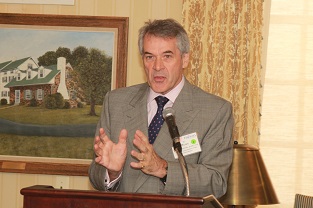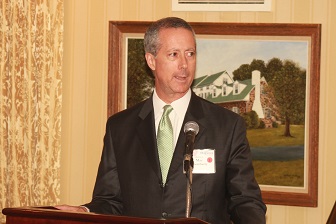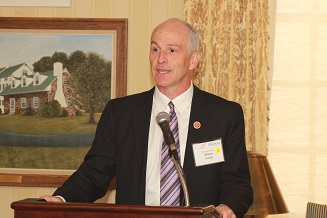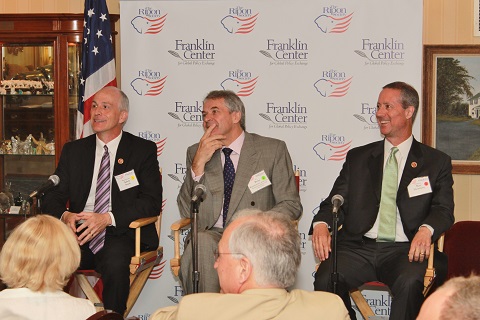British Ambassador Peter Westmacott Joins Armed Services Committee Leaders Mac Thornberry & Adam Smith for Discussion about U.S.-UK Partnership 70 Years After D-Day

WASHINGTON, DC – With the world marking the 70th anniversary of D-Day earlier this month, The Ripon Society held a breakfast discussion this past Friday morning focusing on the “special relationship” between the United States and Great Britain and why the relationship between the two longtime allies remains more important than ever today.
Participating in the discussion were Sir Peter Westmacott, the British Ambassador to the United States, Democratic Congressman Adam Smith (WA-9), the Ranking Member of the House Armed Services Committee, and Republican Congressman Mac Thornberry (TX-13), who serves as Vice Chairman of the Armed Services Committee and who kicked off the discussion by talking about the roots of the special relationship and the values and principles on which the relationship is based.
“We have a shared history, shared language, shared law, shared culture, and shared interests,” the Texas lawmaker stated. “Those things are special not just because we share them, but because many people believe they are the foundations of what we think of as Western Civilization.” Thornberry also recounted a speech that former British Prime Minister Margaret Thatcher delivered in his congressional district in Amarillo in the late 1990s. The speech, he said, was not what he expected, but was one that summed up why the U.S.-UK relationship is so essential.
“I was ready to hear about Gorbachev and the Cold War,” he stated. “But it wasn’t anything like that. She talked about the rule of law. It was more like a law professor’s sort of speech. At the time, I was a little disappointed. But the truth is that she figured she was not there to entertain us with stories about the past. She was there to help warn us about the essential freedoms of our civilization, and that we better not let them get away. Because if we don’t remember and understand — if we don’t protect and nurture the foundations of our strength — we can lose it bit by bit.”
Thornberry was first elected in 1994 and serves on the Intelligence Committee in addition to the Armed Services panel. Recognized as one of the leading experts on national security issues on Capitol Hill, he is also known as someone who believes in the principle of peace through strength.

“I believe that having military strength and knowing when and how to use it appropriately when necessary still matters,” he declared. “And I would say that one of my primary concerns about the special relationship is the downward drift in our willingness to defend ourselves both with money and in spirit; partly because it makes the special relationship a little more one-sided in that area; partly because it limits our joint ability to spread those values we were talking about through the rest of the world; partly because of what it says about what is going on inside our country when we become more self-absorbed. But I do believe the pinnacle of U.S.-British military cooperation was D-Day. If you think about it, it was remarkable. A joint military command — British soldiers serving under American command, American soldiers serving under a British Command. It was remarkable.”
Ambassador Westmacott agreed.
“One of the things worth remembering is the sheer scale and organization of those landings. I think I’m right in saying that in the landings following D-Day, over 350,000 soldiers came ashore. One hundred and seventy five thousand of them were British Commonwealth, and 130,000 roughly speaking were American. It was an extraordinary joint operation that worked for a number of different reasons, not the least of which was the level of preparation that went into it.
“It’s sometimes easy to forget that it was by no means a done deal and by no means straightforward in advance. Something like two million U.S. servicemen came to the United Kingdom in advance of that day. It was an extraordinary number of people. And when you think that the first royal visit to this country had only taken place a few years earlier, in 1939, because the British Ambassador at the time and his predecessors used to advise in the 1920’s and the 1930’s that Britain and America were getting on so badly and were so close to war that it is not a good idea for his Majesty to pay a state visit or indeed any other kind of visit to the ancient colonies. So we came quite a long way.”
Westmacott became British Ambassador to the United States in January 2012. Prior to his service as Ambassador to the U.S., he served as Ambassador to two other members of the NATO Alliance – France, from 2007 to 2011, and Turkey, beginning in 2002. Westmacott discussed the importance of this alliance in his remarks at the breakfast Friday morning.
“Just 10 days ago, for the first time since the 1940s,” he stated, “we had a meeting of all of the Joint Chiefs militarily in London. “It hadn’t happened in the UK, and happened once here in the United States last year. But we have revived the habit of the British and American Chiefs getting together to look at military strength, challenges, budget and all the operational issues that we need to look at together. It was a reminder not only of how closely we do cooperate and how much we share an identity of views and values, but also the extent to which we are embedded with a level of interoperability between the United States and United Kingdom, which is really very extraordinary.

“A few months ago people were asking what do we need the NATO summit for because the Cold War is over. Well, nobody says that anymore. It’s going to be an extremely important occasion. We’ve got to take stock of what’s been going on in Central and Eastern Europe. We have to look at the continuing commitment of other members of the alliance — not just the United States — to shoulder their share of the responsibility to make sure we stay up with the commitment of 2% of GDP to defense spending. The United Kingdom is above that level; not many of our European partners are. It is extremely important as we look at the threats that are around the world which we have to face up to that we all remain absolutely committed to what we are doing together.
“Meanwhile, in addition to dealing with those territory and counter-terrorism issues, we’ve got to deal with cyber and a whole range of other challenges. We’ve also got to deal with, I’m sorry to say, the fallout from things like the Edward Snowden disclosures of what we are up to, in terms of trying to defend our own freedom and our own values. Perhaps I can close just by telling you a little story which was reminded to me by the Chairman of our own Intelligence Select Committee. Back in those days in 1940 and 1941, when it was all dark and we were on our own and it wasn’t at all clear that Hitler wasn’t going to succeed in overrunning the entirety of the European continent, we did have a very, very successful code-breaking operation at a place called Bletchley Park. We did manage to break the codes of the German U-Boats; otherwise we were going to lose the battle of the Atlantic. All those convoys and all that equipment you were kindly sending to us to keep Britain afloat would have gone to the bottom of the ocean. We broke the code. We managed to intercept the U-Boat instructions. We knew where they were coming. We could destroy them. We could warn the convoys. And we began to turn the corner. Thanks to the success of that operation, the United Kingdom survived until the United States came to the rescue after Pearl Harbor.
“Had Bletchley Park been the victim of an Edward Snowden whistle-blowing operation, the entire value of that intelligence operation keeping the United Kingdom in the war would have been lost. So there are moments — which is the point about Bletchley — when it is absolutely essential that intelligence operations in defense of our national security remain secret. These things are important. It’s not frivolous and it is not hiding things. It is necessary for our national security to ensure that our real secrets remain secret.”
Smith echoed the Ambassador’s and Vice Chairman Thornberry’s remarks about the importance of a strong national security posture, but also discussed a number of other areas that must be pursued to bring about peace and stability around the world.
“When you think about it,” Smith observed, “the challenges that we face right now really derive from the basic principles of government. It’s about the rule of law, it’s about freedom, and it’s about representative democracy. It’s about all the places in the world right now that don’t have any of those things and are falling apart as a result and having an impact on the rest of us. How do we work with each other and with them to change that? It’s going to take us working in the Middle East and North Africa and elsewhere to help establish the rule of law and representative democracy and freedom, to build governments that the people can believe in. The fact that so many people in that part of the world don’t believe in their governments leads to the chaos in places like Somalia and Afghanistan and Syria and Iraq. We’re going to have to work together to make that happen.”

“I agree that a strong military is enormously important piece of this,” the Washington lawmaker stated. “But I honestly believe that going forward, the more important policy for us is development policy. How do you work with other countries in the world to build the basic structure of governance so they can govern themselves? And here, nobody does it better than Great Britain. The Department for International Development is a cabinet-level department that does development, and they do it better than anybody else in the world. I got to know Douglas Alexander when he was the Minister of that particular department and have worked closely with him. That is going to have to be part of what we do.
“We could go into Iraq right now and drop a bunch of bombs, and two weeks, three weeks, or six months from now, things would not be really that much different. What we have to figure out how to do is build the basics of governance and the basics of society. Iraq regrettably fell apart this time because Maliki and others didn’t build a lasting government. It’s corrupt and incompetent and the people won’t stand for it. So we’re going to have to work comprehensively on security and on development. And I can think of no better partnership to get that done — and to get that done right — than working with Great Britain.”
To view the complete remarks of Smith, Westmacott, and Thornberry before The Ripon Society’s breakfast discussion this past Friday, please click on the link below:
The Ripon Society is a public policy organization that was founded in 1962 and takes its name from the town where the Republican Party was born in 1854 – Ripon, Wisconsin. One of the main goals of The Ripon Society is to promote the ideas and principles that have made America great and contributed to the GOP’s success. These ideas include keeping our nation secure, keeping taxes low and having a federal government that is smaller, smarter and more accountable to the people.



